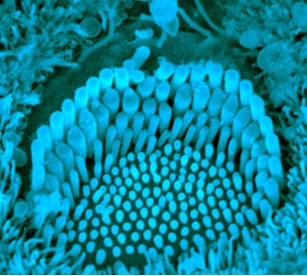July 19, 2013 - Researchers at the National Institute on Deafness and Other Communication Disorders (NIDCD), one of the National Institutes of Health, working with scientists at Boston Children’s Hospital , recently identified two inner ear proteins that are critical for hearing. When certain genetic mutations harm these proteins, a type of delayed, progressive hearing loss may result. Results from the study were published in the July 18 online edition of Neuron .

Scanning electron microscopy image of a sensory cell of the mouse inner ear. This top-down view shows the mechanosensory hair bundle. (Credit: Yoshiyuki Kawashima, NIDCD)
The researchers show that the proteins encoded by the TMC1 and TMC2 genes are components of the channels that turn mechanical sound waves into electrical signals that, in turn, communicate with the brain. A specific mutation in one base or “letter” in the genetic sequence is sufficient to change, but not destroy, the properties and function of the channels to cause progressive deafness.
These findings add to a body of research that is finally identifying, with a high degree of certainty, the proteins and mechanisms involved in the mechanotransduction channel in the inner ear. Corresponding channels for each of the other senses, such as sight, were identified years ago, but the sensory transduction channel for both hearing and the sense of balance had remained a mystery. (See also the NIDCD’s 2011 news release, NIH Researchers Identify Key Proteins of Inner Ear Transduction Channel.)
Bifeng Pan, Ph.D., of Boston Children’s Hospital was first author on the current paper. Andrew J. Griffith, M.D., Ph.D., of the NIDCD was co-senior investigator on the paper. The study was supported by NIDCD intramural research funds Z01-DC000060-10 and NIDCD grants R01-DC05439 and R01-DC008853.
Source: https://www.nidcd.nih.gov/news/releases/13/Pages/071913.aspx

